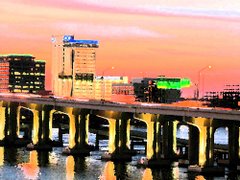 In the southwest quadrant of our compass lie the spheres of the state, politics, and law. On this, the ninth of twelve worldview tours to be completed during the course of The Truth Project, we will take a close and careful look at how the spheres of state, politics, and law are interconnected and how they relate to other aspects of the social realm: family, church, labor, community, and the relationship between God and man. Special attention will be given to the design, structure, and role of the state, its place in God’s plan for human society, and the rightful extent and limits of its power. The state, as we will see, has the capacity to exert a tremendous power for good in the affairs of mankind as long as it operates within its proper boundaries; but it also has the potential to become the most horrendously pathological and abusive of all the social spheres if not kept in check.
In the southwest quadrant of our compass lie the spheres of the state, politics, and law. On this, the ninth of twelve worldview tours to be completed during the course of The Truth Project, we will take a close and careful look at how the spheres of state, politics, and law are interconnected and how they relate to other aspects of the social realm: family, church, labor, community, and the relationship between God and man. Special attention will be given to the design, structure, and role of the state, its place in God’s plan for human society, and the rightful extent and limits of its power. The state, as we will see, has the capacity to exert a tremendous power for good in the affairs of mankind as long as it operates within its proper boundaries; but it also has the potential to become the most horrendously pathological and abusive of all the social spheres if not kept in check.
Significantly, Dr. Tackett begins this tour with a look at older ideas about the relationship between the state and the ethical realm. According to Webster’s 1828 Dictionary, law, politics, and the state are, among other things, concerned with the preservation and improvement of a people’s morals. Though few today would be inclined to accept this definition, a moment’s reflection is sufficient to demonstrate how important it really is. For as Dr. Tackett illustrates by considering a very simple question – “Can the state steal?” – human governments are capable of error and transgression and must be held accountable to a higher ethical law if they are to be prevented from wreaking havoc in the lives of the citizens entrusted to their oversight and care.
God’s perspective on the state, as we will discover through a careful examination of the relevant scriptural passages, is that it is strictly subordinate to His sovereign dominion and control. Just as the Son is subject to the Father, the wife to the husband, and the elders of the church to the headship of Christ, so the authority of the state, within the economy of the divine design for the political sphere, is subject to and dependent upon the authority of God Himself. Governors and magistrates hold their power purely as delegates and representatives of the King of all kings. They are appointed and armed with the sword in order that they might 1) punish evil and 2) condone good. Those who forget these principles and become puffed up with a sense of their own importance are, like Ahab (1 Kings 21), Nebuchadnezzar (Daniel 4:20-30), Uzziah (2 Chronicles 26), and Herod (Acts 12:21-23), liable to swift and severe judgment.
This last point is worthy of special attention; for, as the Bible and history demonstrate, when human rulers overstep their bounds, deny the sovereignty of the various social spheres, and seek to establish state control over every other area of human life, tyranny, oppression, and violence are sure to follow. The godless expansion of the power of the state has reared its ugly head many times in the past, most notably in the 20th century regimes of rulers like Stalin, Lenin, Hitler, Mao, and Pol Pot. It is raising its head again in our own time, says Dr. Tackett. Without God, truth, or any higher moral standard, people are increasingly looking to the state as savior and the supplier of every human need. In the face of this trend, Bible-believing Christians must have the courage to resist what Dr. Tackett calls “The Rise of the State” – to stand firm, draw a line in the sand, and say, “This far and no more.”
Dr. Tackett warns students at the outset of this tour that some may find themselves “conflicted” as they contemplate the implications of his message. This is because, as a result of the raging of the Cosmic Battle, many people in our day have been taken captive by the lie that the state, and not God, is to “go before us” as our savior and sustainer and the source of all good things. This discussion is calculated from beginning to end to expose and challenge this assumption. There are obvious implications here for the debate between proponents of “liberal” and “conservative” social policy (i.e., the “welfare state” and its opponents).
Here is a preview of this weeks lesson:
You can watch the complete lesson here. Contact me (X-trials@BrianBorden.com) if you still need a Username and Password.
See you Thursday!
Sunday, May 16, 2010
The Truth Project - The State: Whose Law?
Posted by Brian Borden at 12:18 AM
Labels: Government, Law, Politics, The Truth Project, X-trials
Subscribe to:
Post Comments (Atom)





0 comments:
Post a Comment